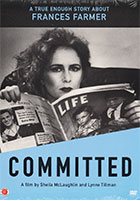
Committed 1984
Distributed by First Run Features, 630 Ninth Avenue, Suite 1213, New York, NY 10036; 212-243-0600
Produced by Sheila McLaughlin & Lynne Tillman
Directed by Sheila McLaughlin & Lynne Tillman
DVD, 74 min., b&w
High School - General Adult
Biography, Feature Films, Mental Health, Women’s Rights
Date Entered: 10/15/2015
Reviewed by Jeffrey Pearson, University of Michigan Ann ArborIndependently produced by a small group of filmmakers in 1984, Committed portrays events in the life of Frances Farmer, an actress who starred in major Hollywood feature films in the late 1930’s and early 1940’s before her life came apart with alcoholism and mental instability. She was falsely declared mentally incompetent by her parents in 1943 and committed to a series of mental hospitals and asylums for several years. This film takes an impressionistic approach to her life and the forces aligned against her, a free-thinking, left-leaning Frances oppressed by anti-Communist fervor in a family and society that regarded a willful woman as mentally ill. The look of this black and white film appears to be intentionally “distressed” by the filmmakers, scratched and flickering, showing scattered, non-sequential scenes that look like “found” footage from her life. Politicians and doctors are shown discussing her outrageous behavior and the necessity of breaking her. Frances argues with her mother. Frances argues, makes love with, and is abused by the playwright Clifford Odets. Her mother gardens, sews, and looks out the window while talking to herself about her problem daughter. There are long dialogue-free scenes in the asylum with Frances looking drugged among the other disturbed inmates, or Frances complaining about everything to a sympathetic nurse. The acting is often good and many scenes affecting, but the film’s artificial construct distanced this reviewer, leaving me unengaged in the film even while sympathetic to the horrendous injustices visited upon Frances Farmer. On the positive side, it did make me want to learn more about her life and see her films.
This film is an optional selection for public and academic libraries that collect independent film, and could be useful for film studies and courses exploring anti-Communist and anti-feminist attitudes in 1940s and 1950s Hollywood.